and why there should be more programs addressing parental mental health and family dynamics education
⚠️ Warning: A Lengthy Post with a Lot of Spoilers Ahead ⚠️
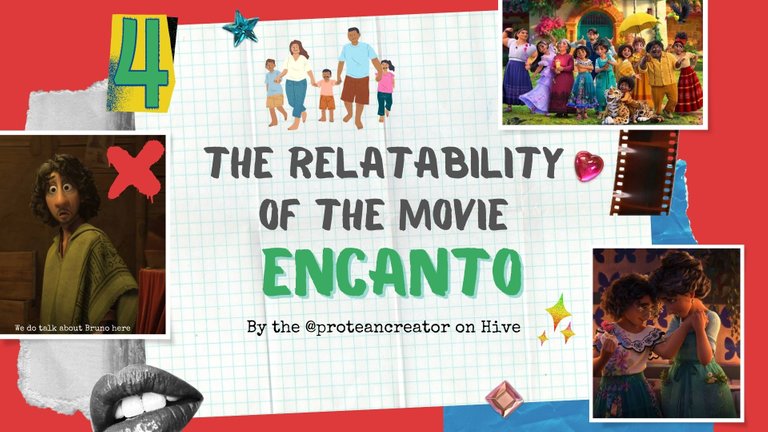
Social media has been buzzing around the movie released on Disney+ titled “Encanto”. The movie features the Madrigal family, a family blessed with a “miracle” or “enchantment (encanto)” in the form of a magic house wherein each Madrigal child is blessed with supernatural abilities by the time they reach a certain age. The way family dynamics and multi-generational trauma is tackled within the movie and incorporated with a musical style of delivery is what is making the movie a hit.
Netizens from various social media praised the lyrics as they hit closer to home, tugging on the heartstrings of anyone who paid close attention. Personally, the effect is no surprise and is as expected from the lyrical rhythmical wizard— Lin Manuel Miranda, himself.
There are many things I want to say about this movie from the fact that my brothers and I have watched it nine times with different people since we got access, to the fact that I could relate to Luisa, Isabela, Bruno, and Mirabel to a fault and even ugly cried at some of the scenes, especially at the end where Mirabel sympathizes with the pain Abuela experienced and had to carry throughout her life, but maybe I'll start with a character analysis and commentary.
Casita, the house of magic
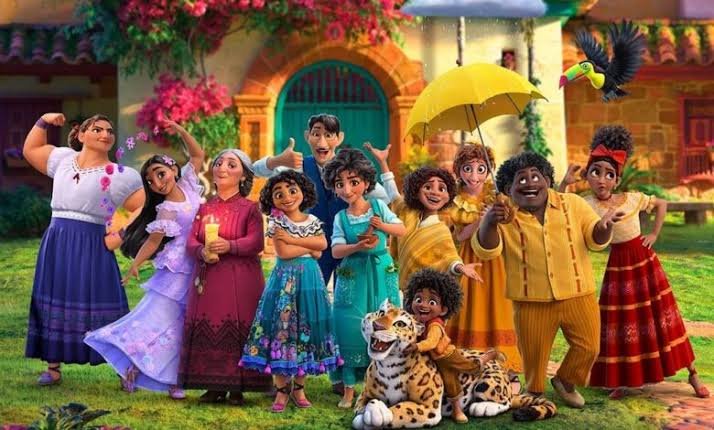
I'll start with the Casita. I don't know if it was obvious, but I'll point it out anyway. The house is a physical manifestation of the quality of the Madrigal’s “home” which may not be the house in the physical sense, but in the sense of the quality of the relationships of everyone in the family.
The physical cracks of Casita represent the cracks within the family relationships, e.g.
- the cracks appeared the first time when Mirabel felt left out when Antonio received his gift,
- the cracks vanished when Mirabel and Isabela hugged as she started sympathizing with Isabela more and encouraged her to pursue her “imperfection”
- and the house completely crumbled when Abuela accused Mirabel of hurting the family because of her “lack of powers”.
Casita was brought back when the house they all tried rebuilding together (including Bruno, and with the help of their town) was finished and the family had “a new foundation”.
Luisa and the crushing weight and expectations of being the tagasalo 🇵🇭
One of the most striking scenes of Encanto was when Luisa, the older sister of Mirabel shared how under the surface of her hard exterior, she feels crushed by the weight of expectations to be strong through the song "Surface Pressure":
Give it to your sister, it doesn't hurt and
See if she can handle every family burden
Watch as she buckles and bends, but never breaks
No mistakes - Surface Pressure from Encanto
Growing up Filipino means being passed on of Asian Hispanic collectivist culture, contrary to the individualistic culture of the West. These are particularly prominent in the Philippines, a developing country, where poverty and inequality are centuries-long battles that still hasn't been completely won until now.
The tagasalo which are usually the panganay (usually, but not necessarily)-- partially, if not completely-- take on the role of being the secondary parent when the primary parents aren't around or available. This responsibility is often given to the ones seen as the more “intact” or "capable" among the siblings which in most cases, are the panganay.
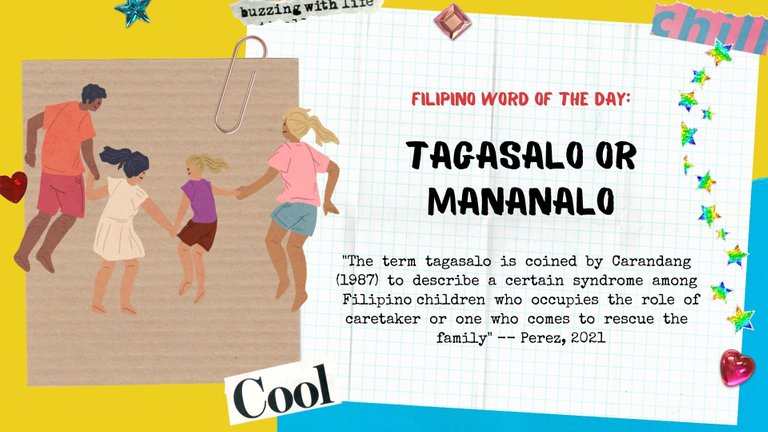
Most often than not, especially in economically pressed families, these individuals are parentified, because "who else are going to take care of the rest of the family while mama and papa work longer hours in the rice fields to make ends meet?"
I'm pretty sure I'm worthless, if I can't be of service -- Surface Pressure from Encanto
In some families, being the tagasalo could mean being expected to help out the family by putting the family's (younger siblings', ageing parents') needs, whether it be instrumental or emotional, above their own.
Some panganays are expected (and thereby, pressured) to graduate early to fund their younger sibling's studies, or fund their aging parents' retirement, or succumb to the unspoken pressure of lifting the family out of poverty which often leaves no room for their individual dreams, or maybe due to emotional strains within the impoverished family even, have to act as the mediating force.
Because of the pressure of these expectations, along with the pressure of being seen as the most reliable of all the siblings which are often bound to their identity, they live little to no room for emotional vulnerability and rest from meeting the expectations that were laid on to them. Like all parentified children, the tagasalo in the family is at risk of developing trauma, distress, disordered eating, mood disorders, substance abuse, and personality disorders if not recognized earlier.
I hope all the pain Luisas of the world are shouldering are acknowledged by their respective families. I hope all the Luisas of the world take a chance to rest, not just physically, but also emotionally. People see the value in what you do, but I hope you don't forget, that you're part of the "people" too.
Isabela, and the suffocation of being the "golden child"
So here's a bit of context: In the first few parts of the movie, Isabela was introduced as Mirabel's older sister. Her power? Making flowers bloom wherever she goes, particularly roses. Mirabel dubbed her as the perfect golden child and even gave not-so-subtle hints that she was envious and not-so-fond of "señorita perfecta", Isabela, who was then engaged to a certain Mariano Guzman.
These two sisters keep brushing each other off the wrong way along the movie. After Isabela's engagement to Mariano fell apart, and Mirabel's plan on earning a hug from her sister ended badly, Mirabel accuses her of being a "selfish entitled princess" (Long story but basically they were having a stand-off and Mirabel was being dragged out of Isabelas's room with vines after failing to apologize sincerely).
In cathartic heat, Isabela confessed that she never wanted to marry Mariano in the first place and was "doing it for the family", and because of that, she was surprised to have been able to grow cacti instead of the usual roses which everyone in town loved, revealed through the song "What else can I do?"
[Isabela:]
I grow rows and rows of roses
Flor de mayo, by the mile
I make perfect, practiced poses
So much hides behind my smile
What could I do if I just grew what I was feeling in the moment?
(Do you know where you're going? Whoa!)
What could I do if I just knew it didn't need to be perfect?
It just needed to be? And they'd let me be?
-- What Else Can I Do, Encanto
From the movie, Isabela is seen having to maintain a persona of perfection as her own way of doing her part in the family. Being the graceful poster girl that she is and growing rows and rows of roses wherever she goes, everyone loves her and adores her. It's almost as if she lived her whole life trying so hard to squeeze into a certain "perfect" mold 🌹 for everyone around her, and never realizing her capacity of what she can do beyond the mold 🌵 and loving herself by staying true in the process.
Isabela often being seen as the emotionally inaccessible sister to Mirabel but like Luisa, she really is just pressured to keep up a façade, much like how rigid overachievers or the “golden child” in the family want to maintain their being a rigid overachiever even if it means at the expense of their own health, because praise, especially from the family, is addicting and is actually just rooted on the underlying fear of becoming a disappointment in the family.
Often, the Isabelas of the world feel suffocated by this façade that they try to maintain, and sometimes they do this as a way to compensate for the real dysfunction that happen within the family behind the scenes.
I hope the Isabelas of the world realize that they don't have to please everyone around them if it means lying to themselves about who they are. Things don't have to be symmetrical to be beautiful.
Bruno, the black sheep
From the poster itself and the song "We Don't Talk About Bruno", it's pretty obvious that Bruno, is a character with a tarnished reputation and is known by his siblings as the one who "lost his way" in the family. He is also an ostracized figure within the town as someone who "causes bad things to happen".
But probably none of it could have hurt more than being neglected and ostracized and villainized by his own mother. When he was begged by his mother to look into Mirabel's future the night she didn't receive her gift and to spare her of the ill reputation he already possessed at that time, he decided to disappear.
But he didn’t actually leave.
Instead, he stayed within the walls of the house for 10 years and loved his family from afar-- the way he knows how, by cementing the cracks of the breaking Casita, even though he was a superstitious person who knocks on wood, sprinkles salt over his shoulder and was afraid to step on cracks. Even when he did “leave”, all he wanted to do was to be accepted and loved and be with his family in the same dining table.
His gift of precognition was not valued, even by his own mother, as he often felt he was a dirty speck of dirt in the golden family image Abuela was trying to maintain. More tragically, it even came to a point where he internalized it and believed it himself. Sometimes I wonder how many children now-adults have felt the same way growing up?
Mirabel, the “not special” special
The story of course, is centered around Mirabel, the quirky, crafty, and empathetic youngest sister of Isabela and Luisa.
The thing about Mirabel is, she's the only Madrigal child who mysteriously wasn't given any powers, and because of this she grew up feeling lackluster and isolated in comparison to the more “special” siblings and cousins.
She is often seen with crafts, skills and various needlework as a way of compensating for her lack of powers?
In a not-so-subtle manner in the movie, she often feels like the out-of-place “weak link” or the “least capable one" by the rest of the family members and more bluntly, by her own Abuela due to her having no “gifts” as revealed by the song "Waiting On A Miracle":
Don't be upset or mad at all
Don't feel regret or sad at all
Hey, I'm still a part of the family Madrigal
And I'm fine, I am totally fine
I will stand on the side as you shine
I'm not fine, I'm not fine -- Waiting on a Miracle, Encanto
It was even visually exhibited when the Casita crumbled during Abuela and Mirabel's fight that she would go through great lengths and great dangers for her family and in saving the miracle.
Despite her lack of powers and the eventual destruction of the Casita, she ends up as the key person in "saving the miracle" by:
✅ acknowledging and comforting Luisa and her pressure to be the strongest in the family
✅ encouraging Isabela to discover her truth beyond the mold of perfection she was expected to fill
✅ talking about Bruno, talking to Bruno and taking the long lost Bruno back home
✅ confronting and pointing out Abuela of her actions after she blames her for hurting the family
✅ rebuilding the Casita and restoring their powers after reconciling with Abuela, understanding the source of her actions and forgiving her after she apologized
In other words, she did that by bringing out the best of her family members, by being authentic and truthful even when things were uncomfortable.
When Bruno told Mirabel in the movie “The fate of the Encanto is not up to her, Mirabel, it’s up to you”. I realized that despite her lack of powers, she was the person who got to dictate the quality of future relationships within the family. It was up to her.
Abuela, the traumatized matriarch of the family
Abuela is the matriarch leader of the family Madrigal. Stern and protective, she does her best in leading the family, and using the gifts that were given to them to serve the community around them.
She cannot be considered a "villain" in a linear and traditional sense. Disney did a great job of portraying her with more dimensions to her personality as a person driven by grief, and the trauma she experienced of losing her home and husband that she carried throughout her life in the Casita. This eventually led her to make very poor decisions around her family.
She is seen as stern and protective of her family the perfect image of the family she upholded, and the family miracle-- the Casita and the gifts-- which was given to her through the death of her husband.
However, the night Antonio received his gift, she was seen praying and talking to her picture of her late husband. From there, we take a peek at how she has always been aware of the fragility of the casita (despite her ignoring of Mirabel's warnings previously) and the her fear of losing it since she lost her previous home last time and didn’t want to lose their home again especially with her children and grandchildren.
As her own way to feel deserving of the miracle, she is often seen putting too much pressure on her family members: for Luisa, to be a pillar of the community; and for Isabela, to be "perfect" in her Abuela's and everyone's eyes . This might be understandable considering that Abuela Alma is not only the leader of the family, but also the community as well, and feels the need to uphold an image of perfection of the family, most times, at the expense of the individual needs of her family members.
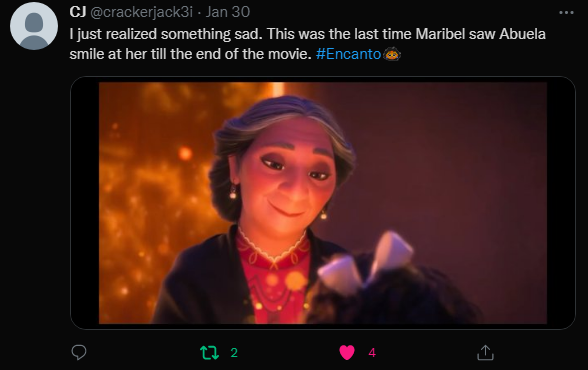
She was able to ostracize her son Bruno in the process, as well as Mirabel-- those who she sees are hurting the image of a family that she wants to paint, or not doing their part.
She was obviously someone who didn't provide enough reassurance to her family members, especially the more vulnerable ones like Mirabel and Bruno who struggled with their self-worth and their place in the family, but instead, marked them "black sheep" and continued to expect the worst of them even though, both have always tried their best in their own ways of making the family proud.
When Abuela witnessed the change in Isabela's character, she was enraged and accuses Mirabel of ruining the casita, and even going as far to blame other things in the family like:
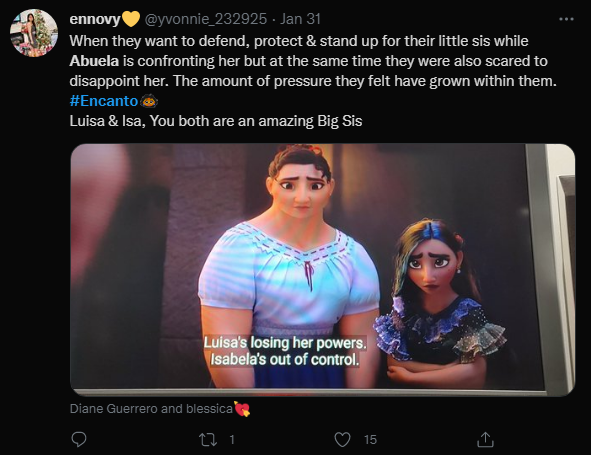
I loved the part in the movie where Abuela apologized to Mirabel, and shared the grief that haunted her ever since. Additionally, she apologized and hugged her long lost son Bruno, all whilst the latter was trying to take in all the blame for himself.
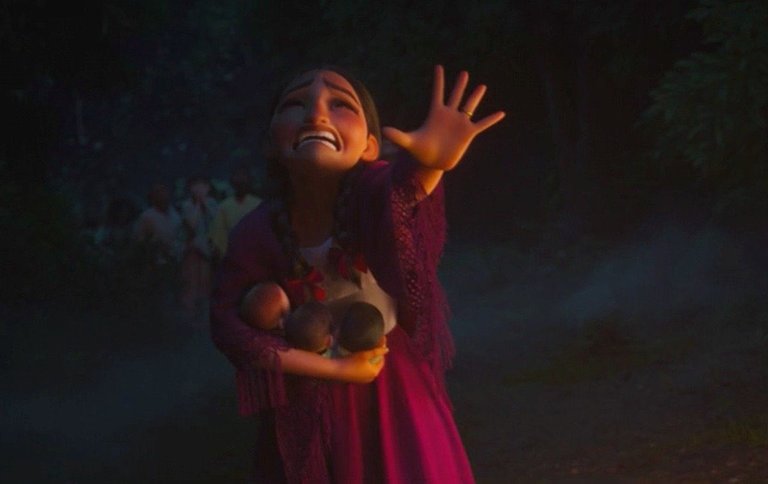
These things I bet, are difficult for the Abuela Almas of the world to do. The decision to recognize where their younger offspring comes from, not dismissing their feelings and apologizing to them, and showing their vulnerabilities to their grown-up children instead of continuously accusing them and blaming them for major problems.
Maybe that's the reason why I found the ending too ideal? Because in real scenarios, some Abuela Almas have difficulty of realizing their mistakes, and don't apologize. Maybe due to their standing within the family? Their pride? Maybe due to old age? Especially for the more traumatized leaders of the family, any form of being point out of their mistakes even in the many ways of expressions out of love, will more or less be taken as insubordination, or in some cases, an insult.
The thing with Abuela Alma reminds me of certain scenarios that hit close to home.
In fact, it could be said that this could be a metaphor for sole bread winning parents in the Philippines (or anywhere where poverty is rampant, rather) who worked hard to elevate their family, parent's and children’s quality of life from poverty. They do this with the goal of preventing their offspring from experiencing the same hardships they internalized and experienced growing up, depending on the internalized trauma, they often are protective and defensive of whatever they gained even if it means dismissing their family member's individual emotional experiences, putting a wedge in their relationships with their family members.
Julieta, the mom of Mirabel with the healing touch of a mother
I love how Julieta was portrayed in the movie as a mom who can heal ailments with her cooking. It really takes the idea of a mother’s healing touch to a whole new level, and I absolutely love the dynamic between her and her husband.
As a mom, she is instinctively shown to read Mirabel's feelings:
"Remember Mirabel, you've got nothing to prove!" Julieta to Mirabel
and basically represents all the mothers around the world who are only as happy as their saddest child (Mirabel). It was even shown in the movie that both she and her husband are pro-active in protecting their daughter's self-worth in the movie:
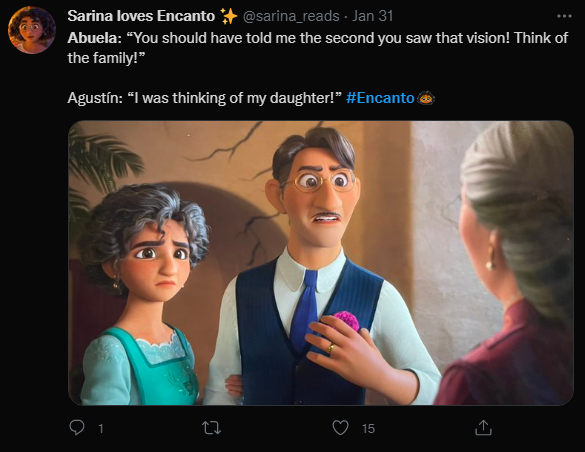
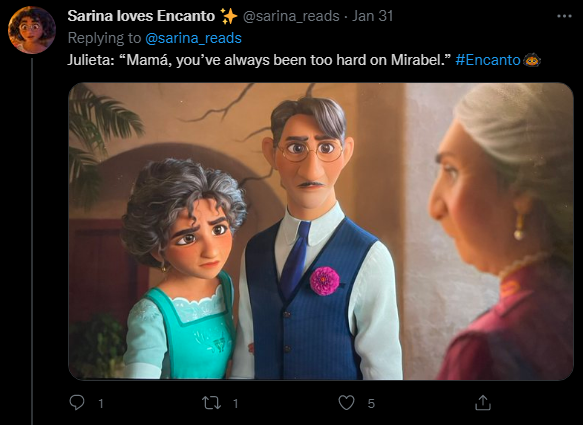
In the words of sarina_reads from Twitter:
SourceI stan parents who stand up for their children against other adults in their family. #Encanto
...and people should too.
So what’s your point Roxanne?
My point is… MULTIGENERATIONAL TRAUMA SUCKS BIG TIME.
I learned about the different roles siblings play within families that have an existing dysfunction. The dysfunction might be subtle like that in Encanto, or it may come at more elevated degrees.
In dysfunctional families, roles within the family tend to be polarized in order to cope with the dysfunction. Here are some examples taken from this site:
| Roles | Description |
|---|---|
| The "Hero" | the one who copes by being the parentified, responsible child; the "poster child" for the family to make the family look good |
| The "Mascot" | the one who copes by providing comic relief, lightening the mood and joking around |
| The "Lost Child" | the one who copes by disappearing or isolating himself/herself from the family and opt for different ways to escape |
| The "Scapegoat" | the one who copes by getting into trouble or "acting out" to gain attention |
| The "Enabler" | the one who copes by denying such family problems exist, maintaining the family status quo, and tries to keep family conflict to a minimum |
Can you point out where you belong? 🤔 Kidding.
My point is THIS --
People should be aware and address these things BEFORE they pursue expanding their family through marriage and parenthood. When people think they “grew up just fine” but have long strings of unhealthy relationships with their work, with food, with vices, with their friends and romantic partners, or their loved ones in general that they are not pro-actively addressing, they are not emotionally ready to become parents and raise emotionally healthy children.
Governments should support and allocate more funds in educating parents about emotional health and family dynamics as family is the the basic unit of a community, and how an individual ends up in adulthood is dictated by a lot of factors including the type of relationship dynamic he or she was exposed to growing up.
Lay down your load (lay down your load)
We are only down the road (we are only down the road)
We have no gifts, but we are many
And we'll do anything for you -- All of You, Encanto
With the help of the community, like in the movie during the song "All of us", family relationships get to be repaired quickly once the family members are aware of what is happening and know what to do.
Readings:
- Ang Pagsalo: A Parentification Study Among Female Adolescents
-Tagasalo Personality Review by Arnel Perez - Parentification Experiences of Filipino Young Professional Daughters During the COVID-19 Pandemic
- The 10 Worst Things Abuela did in the movie, Encanto
- 8 Dysfunctional Roles Within The Dysfunctional Family
-The many tweets from Twitter users with the hashtag #Encanto

Roxanne Marie is the twenty-year-old something who calls herself the Protean Creator.
She is a chemical engineer by profession, pole-dancer and blogger by passion and frustration, and lastly, a life enthusiast. She is on a mission to rediscover her truth through the messy iterative process of learning, relearning and unlearning. Currently, she works as a science and research instructor in her hometown, Tagbilaran City, all the while documenting her misadventures, reflections and shenanigans as a working-class millennial here on Hive.
If you like her content, don't forget to upvote and leave a comment to show some love. It would be an honor to have this post reblogged as well. Also, don't forget to follow her to be updated with her latest posts.
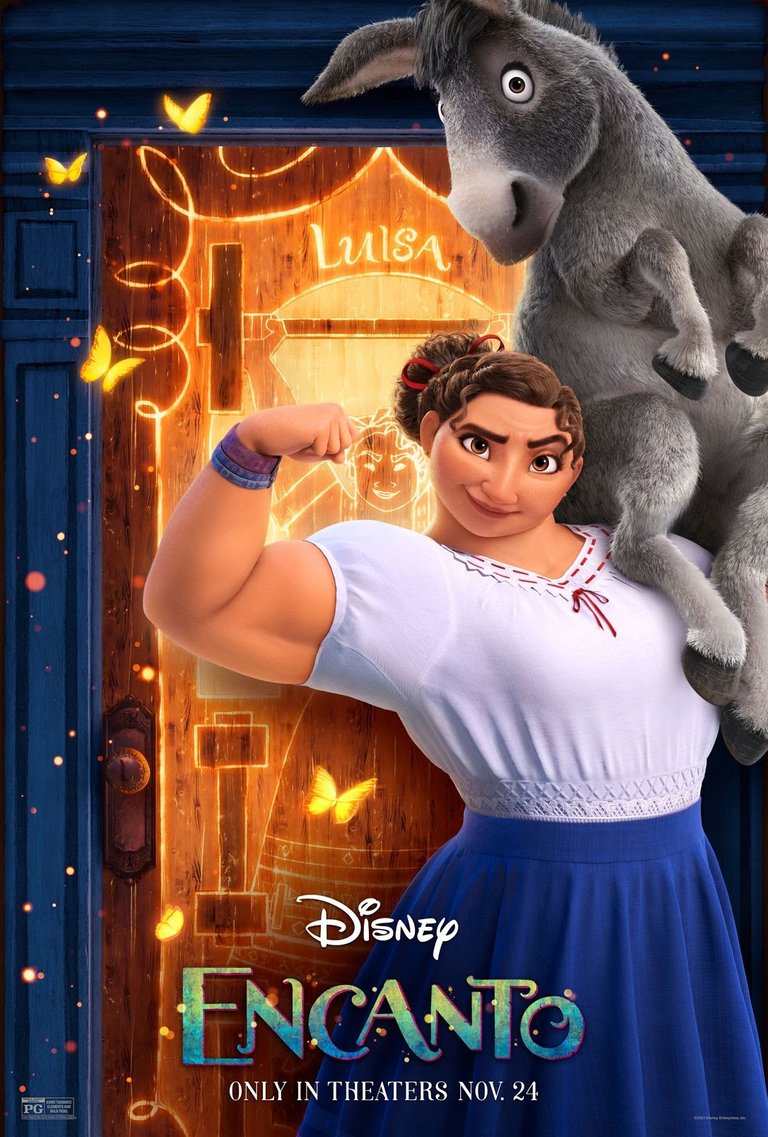

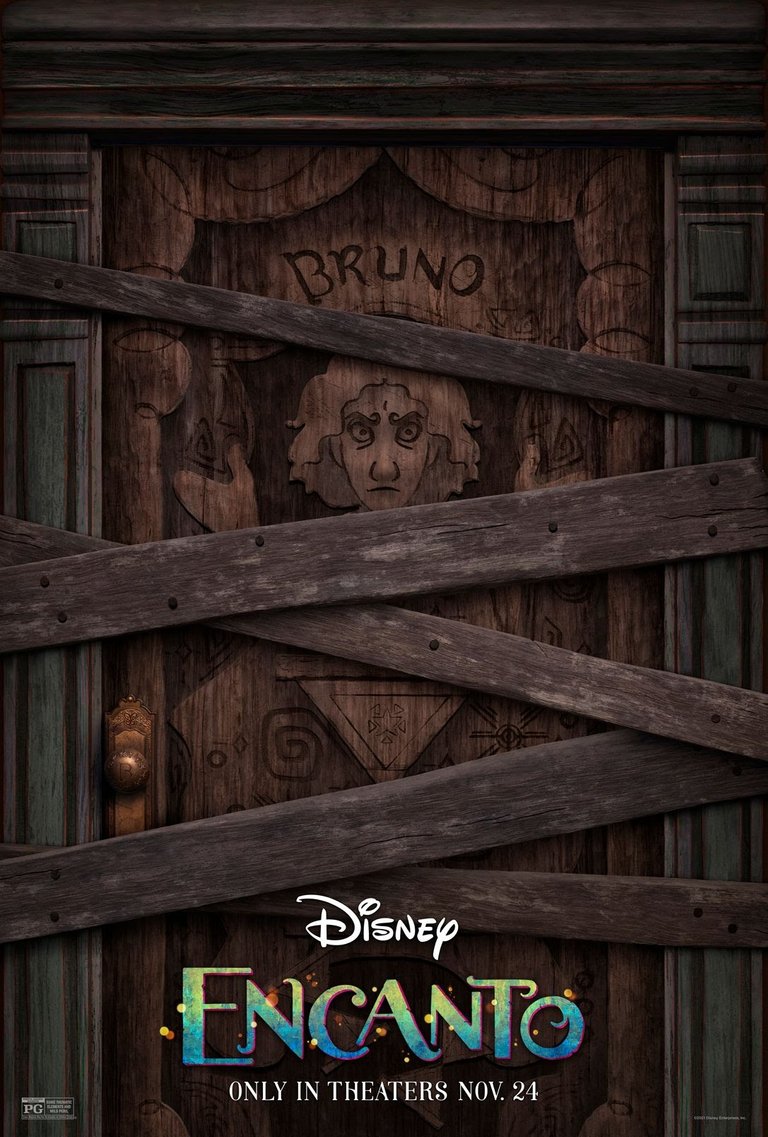
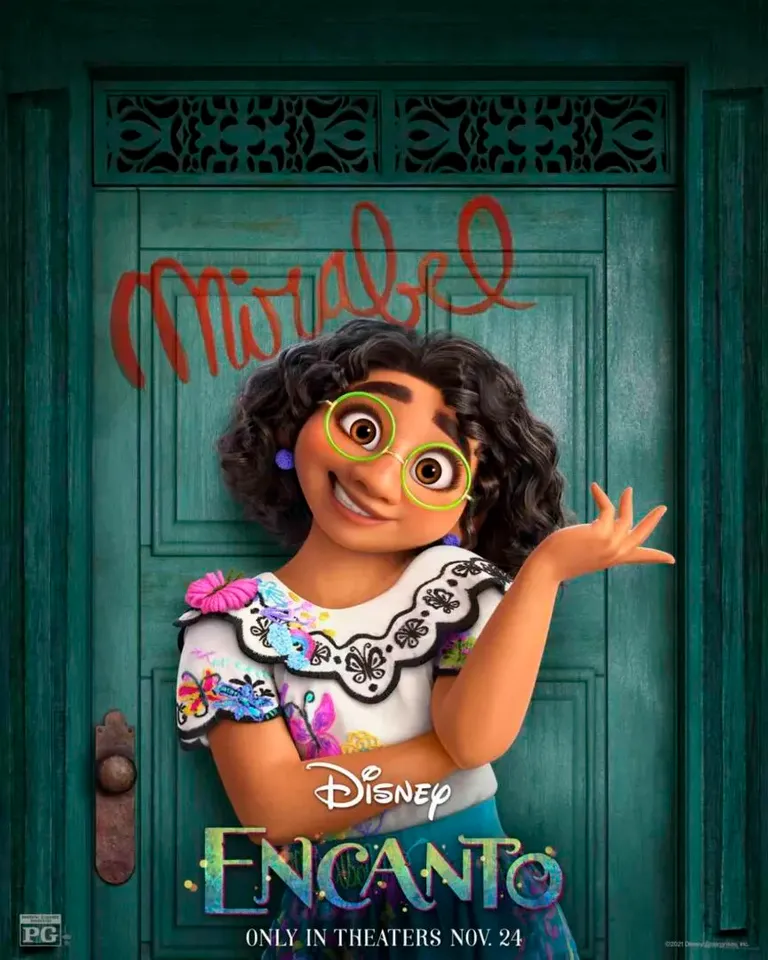
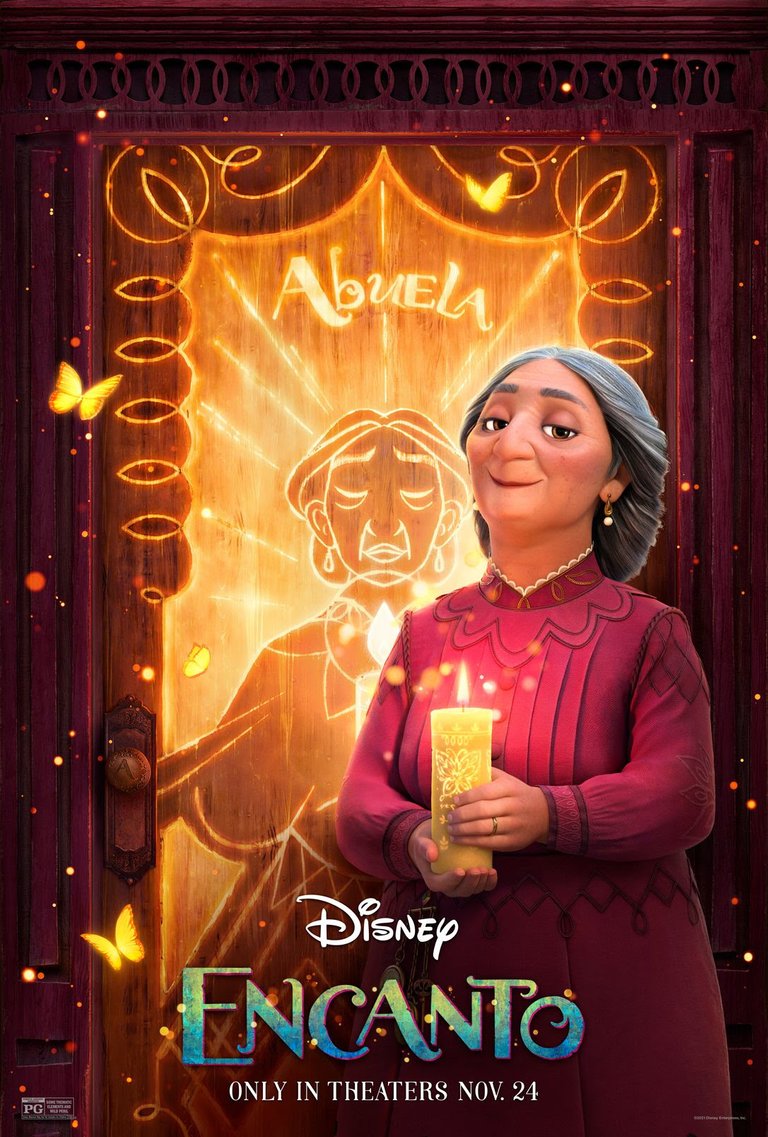
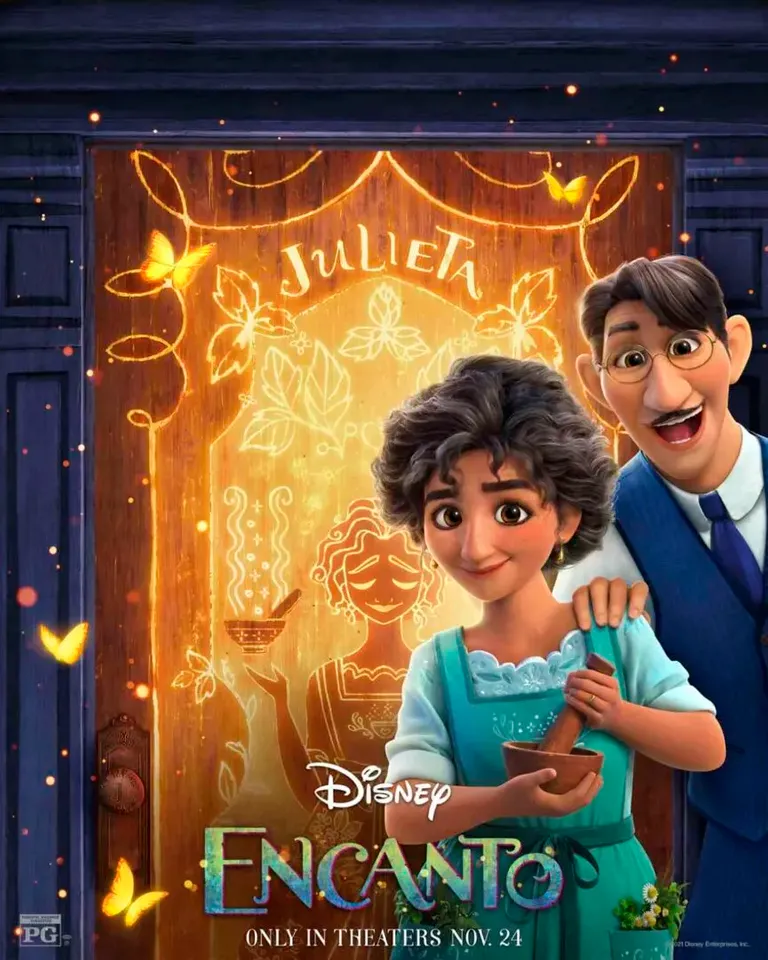
Great analysis! Truly, Luisa is reminiscent of the Filipino "Tagasalo". There's just that ate or kuya who is expected to help out their parents in raising the younger ones. And, I agree, the ending was a little too ideal. Can't imagine it in real life. A great thing this movie did though was that it got people talking about multi-generational trauma. It's movies like this that aids build a better society.
Absolutely stunning and well written analysis. I loved watching the film and noticed a few of these the first time round, but now I want to watch it again to see all the other things you mentioned!
Thank youuu!❤️
!discovery 30
This post was shared and voted inside the discord by the curators team of discovery-it
Join our community! hive-193212
Discovery-it is also a Witness, vote for us here
Delegate to us for passive income. Check our 80% fee-back Program
Me encanto tu forma de explicar esta película, excelente reflexión, aunque la tuve que traducir.
Gracias amiga ✨
I am east asian man.Dear @proteancreator, Nice meet to you! Are you philipino woman?
Wow, This article is very good! I was curious about the Filipinos and society, and I think i will know a little bit by reading this article.
I thought it was a great analysis of Filipinos and society that I didn't find in the articles by my friend @juecoree and @asasiklause.
Thank you!
Hi @goldgrifin007! Yes I am-- a born & raised Visayan Filipina ❤️.
I'm glad you thought so, and you're welcome. You should really try the reading the articles I linked at the end of my article. You get to read more about the Tagasalo syndrome that is quite common in the country.
Thank you for your advice!
I've never read an analysis this well-made. Good job! Also, I'm a little guilty of watching Encanto for the nth time myself!
When I first saw it, Luisa's song gave quite an impact. Got me a bit sentimental too because I know exactly how she feels especially with being the panganay. "Bend but never break," right? 😂
Pretty much the theme song for all panganays and tagasalos out there yeah 🥲
WKWKWKW
FOLLOW & UNFOLLOWED